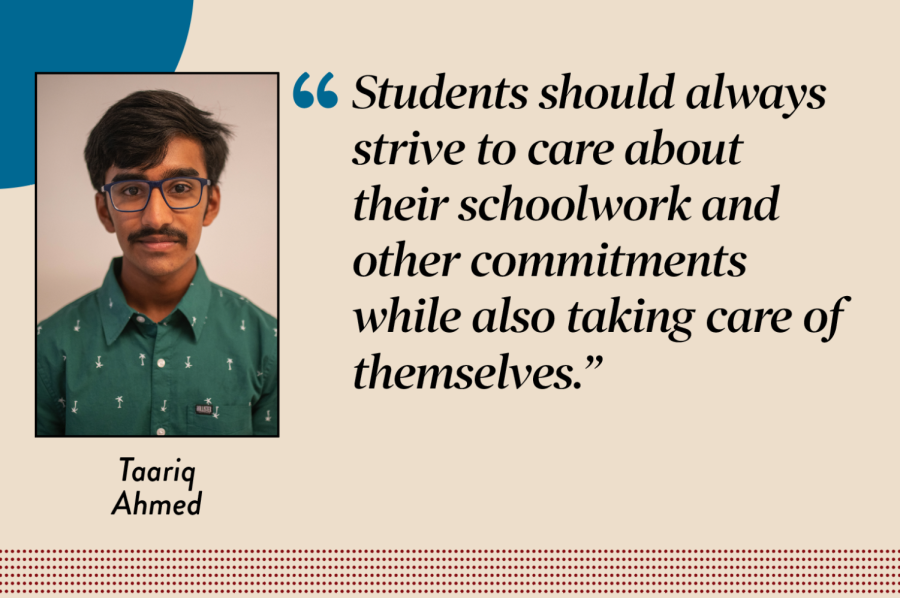Students should strive to balance lifestyle on a small and large scale
Midway Staff
Taking time to consider the workload that students bring upon themselves throughout a school year on end, both inside and outside of school, can allow students to devise and maintain healthy lifestyles.
December 15, 2022
It hadn’t even been two weeks since my family and I moved to Chicago, and I was already immersed in the world of U-High. One night, at around 11 p.m., I was getting ready to go to bed, assured that I had finished all my homework for the day. As I looked over my lengthy list of checked-off assignments, I realized I still had an English assignment left to do.
Immediately, I was at war with myself. My mind, focusing on school, wanted to keep going, but my body, exhausted by the work, needed to stop.
So, I listened to myself, but I didn’t go to sleep right away. I quickly shot my English teacher an email asking if I could have an extra day for the assignment. Fifteen minutes later, my English teacher wrote back and granted me the extension. The next day, I finished the assignment and turned it in, thoughtfully and thoroughly.
I found this to be a small reminder of why every student should remember to take care of themselves, especially balancing workloads on a small and large scale, and how doing so is essential to a healthy lifestyle. Students should always strive to care about their schoolwork and other commitments while also taking care of themselves.
Asking for extensions, especially in spaces as academically focused as Lab, can sometimes be viewed as a sign of weakness or a lack of control over workload. However, doing so does not make students less intelligent in any way; it actually demonstrates the opposite. If students acknowledge their breaking point and stop themselves from reaching it, they can protect their health and the quality of their work. Additionally, students indicate to their teachers that they know how to effectively communicate with them.
I understand the concern that asking for extensions may cause students to fall behind in their classes. After all, asking for an excessive amount can show that a student is not capable of handling the coursework and can be considered unethical, or even unfair. And that is why students should be proactive and strive for balance beyond just how much homework they complete in one night, but within their lifestyle in general. Page 15 of the U-High Student and Family Handbook states:
“Due to the wide variety of courses available at U-High, students’ academic schedules vary widely. Likewise, students’ homework obligations vary widely, depending on the courses they choose. It is recommended that students refer to the U-High Program of Studies in regards to course expectations when making their course selections.
Homework is but one factor that determines the pace and saturation of a student’s daily and weekly life. Please carefully consider the following factors, and engage in a realistic discussion as a family when selecting courses: the number of courses you want/need to take, course levels, homework expectations for all courses, your individual learning style, co-curricular commitments, [and] social habits and other lifestyle choices.”
Taking time to consider the workload that students bring upon themselves throughout a school year on end, both inside and outside of school, can allow students to devise and maintain healthy lifestyles.
At my old school, I had indulged in the “bring it on” mindset of overachievement and immediately started to notice a decline in my overall well-being as burnt out friends and classmates of mine dropped like flies all around me. That was when I realized that a student’s success carries little value if the student is unable to find time for themselves. When I arrived at U-High, not only was I entering a world of rigorous curriculum, but I knew that it would take time to adjust to my family’s new way of life. So before the school year began, I made sure everything was to be balanced, if not for myself, then for those who depend on me.
In an age where teenage stress is increasing at record rates, finding ways to a healthy lifestyle is extremely important. This is especially true when considering that “the grind” doesn’t end when students graduate high school. College life, and then eventually professions in the real world, will continue to keep students busy long after they leave U-High.
Besides stabilizing daily and long-term workloads, the Centers for Disease Control and Prevention suggests other ways for teenagers to deal with stress: eating healthy and getting plenty of sleep, spending time with family and friends, refraining from excessive use of social media and news intake, and finding time to unwind. Establishing sustainable working habits in high school will prepare students for success, and allow them to grow into healthier adults in the future. With winter break just around the corner, students should use their time off to reorganize themselves and reflect on the level of balance in their lifestyles.




























































